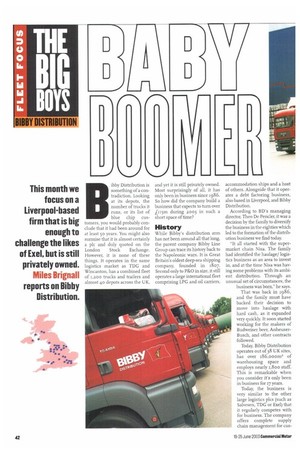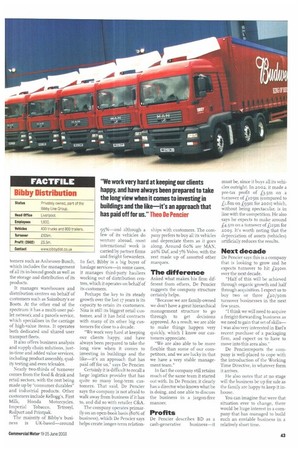B ibby Distribution is something of a contradiction. Looking at its
Page 42

Page 43

If you've noticed an error in this article please click here to report it so we can fix it.
depots, the number of trucks it runs, or its list of blue chip customers, you would probably conclude that it had been around for at least 50 years. You might also surmise that it is almost certainly a plc and duly quoted on the London Stock Exchange. However, it is none of these things. It operates in the same logistics market as TDG and Wincanton, has a combined fleet of 1,200 trucks and trailers and almost 40 depots across the UK,
and yet it is still privately owned. Most surprisingly of all, it has only been in business since 1986. So how did the company build a business that expects to turn over iti5rn during 2003 in such a short space of time?
History
While Bibby's distribution arm has not been around all that long, the parent company Bibby Line Group can trace its history back to the Napoleonic wars. It is Great Britain's oldest deep-sea shipping company, founded in 1807. Second only to P&O in size, it still operates a large international fleet comprising LPG and oil carriers, accommodation ships and a host of others. Alongside that it operates a debt factoring business, also based in Liverpool, and Bibby Distribution.
According to BD's managing director, Theo De Pencler, it was a decision by the family to diversify the business in the eighties which led to the formation of the distribution business we find today.
"It all started with the supermarket chain Nisa. The family had identified the haulage/ logistics business as an area to invest in, and at the time Nisa was having some problems with its ambient distribution. Through an unusual set of circumstances, the business was born," he says.
That was back in 1986, and the family must have backed their decision to move into haulage with hard cash, as it expanded very quickly. It soon started working for the makers of Budweiser beer, AnheuserBusch, and other contracts followed.
Today, Bibby Distribution operates out of 38 UK sites, has over 186,00=2 of warehousing space and employs nearly 1,80o staff. This is remarkable when you consider it's only been in business for 17 years.
Today, the business is very similar to the other large logistics plcs (such as Salvesen, TDG or Exel) that it regularly competes with for business. The company offers complete supply chain management for cus tamers such as Anheuser-Busch, which includes the management of all its in-bound goods as well as the storage and distribution of its products.
It manages warehouses and distribution centres on behalf of customers such as Sainsbury's or Boots. At the other end of the spectrum it has a multi-user pallet network and a parcels service, which specialises in the carriage of high-value items. It operates both dedicated and shared user transport fleets.
It also offers business analysis and supply chain solutions, justin-time and added value services, including product assembly, quality testing and even telesales.
Nearly two-thirds of turnover comes from the food & drink and retail sectors, with the rest being made up by "consumer durables" and industrial products. Other customers include Kellogg's, First Milk, Honda Motorcycles, Imperial Tobacco, Tetrosyl, Railpart and Printpak.
The majority of Bibby's business is UK-based—around 95%—and although a few of its vehicles do venture abroad, most international work is carried by partner firms and freight forwarders. In fact, Bibby is a big buyer of haulage services—in some cases, it manages third-party hauliers working out of distribution centres, which it operates on behalf of its customers.
Perhaps the key to its steady growth over the last 17 years is its capacity to retain its customers. Nisa is still its biggest retail customer, and it has held contracts with many of its other big customers for close to a decade.
"We work very hard at keeping our clients happy, and have always been prepared to take the long view when it comes to investing in buildings and the like—it's an approach that has paid off for us," says De Pencier.
Certainly it is difficult to recall a large logistics provider that has quite so many long-term customers. That said, De Pencier says the company is not afraid to walk away from business Wit has to, and did so with retailer C&A.
The company operates primarily on an open-book basis (8o% of business), which De Pencier says helps create longer-term relation
ships with customers. The company prefers to buy all its vehicles and depreciate them as it goes along. Around Go% are MAN, zo% Daf, and 7% Volvo, with the rest made up of assorted other marques.
The difference
Asked what makes his firm different from others, De Pencier suggests the company structure certainly helps.
"Because we are family-owned we don't have a great hierarchical management structure to go through to get decisions approved. As a result, we are able to make things happen very quickly, which I know our customers appreciate.
"We are also able to be more flexible than some of our competitors, and we are lucky in that we have a very stable management team."
In fact the company still retains much of the same team it started out with. In De Pencier, it clearly has a director who knows what he is doing, and one able to discuss the business in a jargon-free manner.
Profits
De Pencier describes BD as a cash-generative business—it must be, since it buys all its vehicles outright. In zooz, it made a pre-tax profit of L3.5m on a turnover of Li o5m (compared to fi.8m on L93m for 2001) which, without being spectacular, is in line with the competition. He also says he expects to make around f4.5m on a turnover of Liism for 2003. It's worth noting that the depreciation of assets (vehicles) artificially reduces the results.
Next decade
De Pencier says this is a company that is looking to grow and he expects turnover to hit .f2,5om over the next decade.
"Half of this will be achieved through organic growth and half through acquisition. I expect us to buy two or three L.2. 0 /3 0/71 turnover businesses in the next few years.
"I think we will need to acquire a freight-forwarding business as we need to gain that set of skills— I was also very interested in Exers recent purchase of a packaging firm, and expect us to have to move into this area also."
De Pencierreports the company is well-placed to cope with the introduction of the Working Time Directive, in whatever form it arrives.
He also notes that at no stage will the business be up for sale as the family are happy to keep it inhouse.
You can imagine that were that situation ever to change, there would be huge interest in a company that has managed to build such an enviable business in a relatively short time.














































































































































































